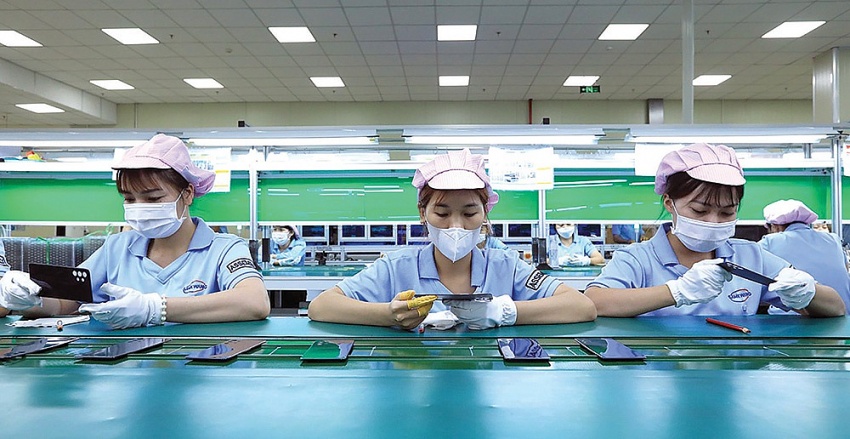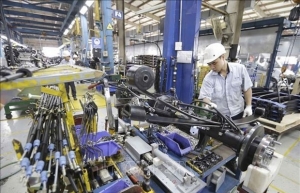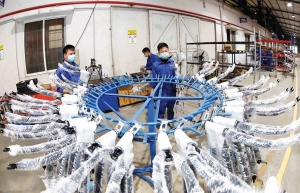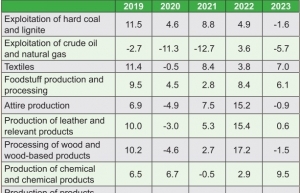Recruitment makeup faces a reshuffle
Footwear manufacturer TBS An Giang JSC in the Mekong Delta province of An Giang’s Thoai Son district would like to recruit about 1,900 workers in the second quarter of the year, and 1,000 additional workers at the end of the year, due to an expected increase in orders for 2025.
 |
| Key factors that affect job choices include industrial transformation, new roles, and mass layoffs, Photo: Duc Thanh |
Vietnam Samho in Ho Chi Minh City’s Cu Chi district needs 1,500 workers, and has already recruited about 300 over the last two months.
“Working in human resources at this time is extremely stressful because finding people is getting difficult,” said Nguyen Thanh An, chairman of the company’s trade union. “Orders are rising, so we need more workers. Recruitment information is posted everywhere, but not many candidates apply.”
An connected with nearby provinces and visited various districts and communes to hunt for employees. After two months of travelling to numerous provinces, the company has recruited more than 300 people in An Giang’s Tri Ton district.
Other manufacturers are also struggling with recruitment. Director of Ho Chi Minh City Employment Service Centre Nguyen Van Hanh Thuc, said that about 49,000 jobs were offered in May but only 8,500 people were looking for work, while the number of people registered to receive unemployment benefits reached nearly 60,000.
“Recruitment demand is increasing but it is getting hard to find employees,” Thuc said. “Recently, the centre organised 21 job exchanges to connect workers and businesses. However, often the number of recruiters was higher than the jobseekers. Despite extending the age range to 40-45, some employers do not have enough quantity.”
Many factories in other provinces are thirsty for labour, especially in some industries such as textile and garments, leather and footwear, and wood production and processing.
According to Binh Duong Department of Labour, Invalids, and Social Affairs, about 3,200 enterprises want to recruit nearly 41,000 employees, of which the vast majority are workers and unskilled workers. However, many have not found enough people to meet their needs. To support businesses, the department connects with local employment service centres.
In May, factories in the southern province of Dong Nai needed more than 10,700 people, mostly unskilled workers. They have prolonged the deadline for receiving applications because of the lack of responses.
Nguyen Hong Quang, deputy director of An Giang Economic Zones Management Board, said that recruitment in Binh Hoa Industrial Park was facing many difficulties.
“Recently, a business requested importing labour from abroad to produce orders in April and May but was not approved because it was not in accordance with Vietnamese law. This company has transferred the order to a factory in Ho Chi Minh City to complete the contract on schedule,” Quang said.
Thuc from Ho Chi Minh City Employment Service Centre said that unskilled workers had more options other than just going to factories like before.
“Other jobs like ride-hailing and delivery services with flexible times are the favourite choice for them right now. Additionally, some industrial areas and factories have sprung up in their provinces and districts, so the number of workers migrating to the big cities has been going down,” she said.
Arriving at numerous districts and communes, and meeting workers directly, Nguyen Thanh An from Vietnam Samho said, “People don’t want to live in big cities any more. After the pandemic, they feel safer in the countryside. It has made another pathway for labour, especially as there are jobs in the countryside and things are not as expensive,” An said.
Le Thi Oanh in An Giang’s Chau Thanh district said that after her company cut labour, she has been selling fruit and other consumer goods online. “Although my income is not regular, I do not want to go back because workers doing fewer hours are always first in line for layoffs,” she said.
Tran Thi Phuong in the same district quit her job when she was about to turn 40 years old. The industrial environment was difficult because her health was not good, and her productivity not the same as the younger workers. “I would like to learn a new vocation to start a job at home and have some income that way,” she said.
Nguyen Duc Loc, chairman of the Social Life Research Institute in Ho Chi Minh City pointed out the key factors that affect workers’ job choices: industrial structural transformation, new jobs appearing, and a big shock to society caused by the pandemic and mass layoffs.
“Working in a factory is no longer meaningful because it could end at any time. Therefore, people are now interested in seasonal, short-term jobs to proactively manage their life and work. The conditions for this are favourable as many new jobs offering flexible time have appeared,” Loc said.
“Of course, not all workers will say no to factory work, but they will choose working places that have good policies for workers,” Loc added. “For example, factories that rushed to cut employees during the pandemic and amid order reductions, will face more difficulties than those that tried not to abandon their workers and instead fulfilled their social responsibilities.”
 | Shoots of recovery seen in industrial production Although Vietnam’s targeted economic growth may be unreachable, there are positive signs of recovery in industrial production and business confidence. |
 | Activities in industrial production heat up Vietnam’s industrial performance is looking up, with the economy forecasted to see a stronger outlook moving into next year. |
 | Pro-business landscape heads industrial production wishlist Despite a slowdown in industrial production, confidence among the business community is expected to continue climbing, which is backed by government efforts to provide a more friendly business environment. |
What the stars mean:
★ Poor ★ ★ Promising ★★★ Good ★★★★ Very good ★★★★★ Exceptional
Related Contents
Latest News
More News
- Vietnam to lead trade growth in ASEAN (January 29, 2026 | 15:08)
- Carlsberg Vietnam delivers Lunar New Year support in central region (January 28, 2026 | 17:19)
- TikTok penalised $35,000 in Vietnam for consumer protection violations (January 28, 2026 | 17:15)
- Digital economy takes centre stage in Vietnam’s new growth model (January 28, 2026 | 11:43)
- EU Council president to visit Vietnam amid partnership upgrade (January 28, 2026 | 11:00)
- Vietnam entering a new growth phase in 2026 (January 28, 2026 | 10:02)
- VIMC targets higher profit and throughput in 2026 (January 26, 2026 | 19:00)
- GEVA a launchpad for Vietnam’s agricultural exports (January 26, 2026 | 12:03)
- Data-driven risk management signals major shift in customs administration (January 24, 2026 | 11:22)
- Cosmetics rules set for overhaul under draft decree (January 24, 2026 | 11:21)

 Tag:
Tag:
















 Mobile Version
Mobile Version